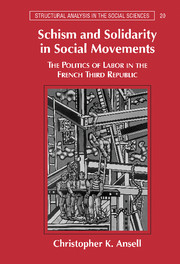Book contents
- Frontmatter
- Contents
- Acknowledgments
- 1 The Struggle and the Conciliation
- 2 Schism and Solidarity
- 3 Vox Pouli, Vox Dei
- 4 Esprit de Corps
- 5 Organizing the Fourth Estate
- 6 The New Covenant
- 7 “Above All We Are Syndicalists”
- 8 From Congregation to Reformed Church
- 9 Dealignment
- 10 The Party the Syndicalists Built
- 11 Conclusion
- Works Cited
- Index
9 - Dealignment
Published online by Cambridge University Press: 21 July 2009
- Frontmatter
- Contents
- Acknowledgments
- 1 The Struggle and the Conciliation
- 2 Schism and Solidarity
- 3 Vox Pouli, Vox Dei
- 4 Esprit de Corps
- 5 Organizing the Fourth Estate
- 6 The New Covenant
- 7 “Above All We Are Syndicalists”
- 8 From Congregation to Reformed Church
- 9 Dealignment
- 10 The Party the Syndicalists Built
- 11 Conclusion
- Works Cited
- Index
Summary
Perhaps it is characteristic of many forms of institutional equilibrium that as soon as they have been formed, they begin to undergo pressures for change. Nearly as soon as the second alignment of the French labor movement had been consolidated, it began to experience strong pressures internally and externally. Although this alignment would largely withstand these pressures until 1920–1, certain institutional developments during this period foreshadowed later schisms. In particular, this period witnessed attempts to create a strong revolutionary party that would be strongly aligned with the revolutionary wing of the unions. These attempts to create a revolutionary party foreshadowed the rise of the French Communist party in the postwar period.
A number of historians have noted the changes that occurred in the period between 1910 and 1914 in the labor movement. However, they have focused mainly on the tendency of the revolutionary syndicalists to become more reformist (also foreshadowing many of the developments in the CGT in the postwar period). However, little attention has been paid to the countervailing tendency to create a revolutionary party. Because these attempts to fashion a revolutionary bloc were unsuccessful, they may seem to deserve little more than historical footnotes. But in one very important sense they provide an insight into the ultimate explanation for the development of the Communist party.
- Type
- Chapter
- Information
- Schism and Solidarity in Social MovementsThe Politics of Labor in the French Third Republic, pp. 176 - 197Publisher: Cambridge University PressPrint publication year: 2001

